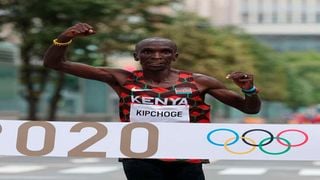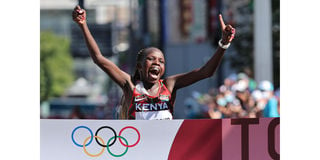
Kenya's Eliud Kipchoge crosses the finish line to win the men's marathon final during the Tokyo 2020 Olympic Games in Sapporo on August 8, 2021.
Weekend
Premium
Kipchoge’s documentary and the need to tell stories of our athletes
What you need to know:
- On Sunday August 8, 2021, Kipchoge blitzed at a furious pace and shone like the sun when he won the Olympic gold medal.
- This win was especially sweet because almost a year ago, on October 4, 2020, Kipchoge lost the London Marathon title to Ethiopian Shura Kitata.
“Watching Eliud Kipchoge run a marathon is like watching the sun rise. Not sunrise, that cheap tangerine moment when the sun first cracks the horizon, that insurance-commercial symbol of a fresh start, new day, whatever. But the sun, rising. That inexorable progress, becalmed, indifferent, a relentless passage across the hours of a morning.
Yes, that blinding disc of light, climbing the same morning sky we all live beneath, a movement you might reasonably forget to assess as you travel each day toward work: through your bedroom window, above your garden, framed over your coffee shop, hanging above the interstate (road) on your commute.
That sun, rising, and Kipchoge, running — both exceedingly small images captured in a photograph — are incomprehensibly grand considered against the entire planet. He is a spectacle… He smiles when he runs.” That was Tom Chiarella writing in 2018.
And indeed, on Sunday August 8, 2021, Kipchoge blitzed at a furious pace and shone like the sun when he won the Olympic gold medal, becoming probably the greatest long-distance runner of all time.
This win was especially sweet because almost a year ago, on October 4, 2020, Kipchoge lost the London Marathon title to Ethiopian Shura Kitata who charged in a frenetic, flamelike speed into the bullring — head down and horns forward.
Many outstanding accomplishments
The Ethiopian shattered the pedestal of Kipchoge’s invincibility into shards — leaving people shell-shocked around the globe.
“I am disappointed,” Kipchoge had said after the race in which he said he had suffered a blocked ear; cutting a desolate, if not forlorn figure on a chilly London day and sounding like a poet of disappointed love.
Fortunately, the 2021 Olympic gold has erased all memories about Kipchoge’s London loss. However, the loss was important if only to highlight that Kipchoge is human and that there are days he struggles like the rest of us mortals. His greatness rests on many outstanding accomplishments. His name swirls in our consciousness as one of the living legends.
“Some talk of Alexander, and some of Hercules, of Hector and Lysander, and such great names as these” sung the British Grenadiers as they marched. For Kenyans, we talk of legends like Eliud Kipchoge, Samuel Wanjiru, Paul Tergat, David Rudisha, Brigid Kosgei, Hellen Obiri, Tegla Loroupe, Catherine Ndereba and such names as these.
Shakespeare, the Bard of Oxford, wrote in Twelfth Night that, “Some men are born great, some achieve greatness, some have greatness thrust upon them”. For Kipchoge, greatness was something he achieved through sheer determination, discipline and brutal training.
He is known for paddling the air and in long, graceful strides, he has engaged in physical and mental duels with competitors in the field, reeling them in and surging past them even as he smiled. Like other Kenyan athletes, he is known for his final, devastating, photo finishing sprints that break competitors’ hearts.
'Kipchoge: The Last Milestone'
It is, therefore, encouraging that Kipchoge’s life story is being retold and will be immortalized in a documentary that has since been released. Entitled, “Kipchoge: The Last Milestone”, the documentary by the Ridley Scott Creative Group will feature the extraordinary life of the record-setting Kenyan champion.
The documentary shows footage from his home, interviews with those closest to him, his training rituals and how he works with his community. It’s important that we tell the stories of Kenyan athletes in every way we can: through articles, memoirs, fiction, movies and documentaries.
This is especially important because the active lives of athletes in competitive sports and their exploits pass quickly as they retire early like all sportspeople. They are soon replaced by others — so it’s imperative that we record their sporting feats before they are supplanted and forgotten.
This is important not only to encourage other sportspeople but also for future generations to know our sports heroes. Additionally, in an age constantly looking for mentors, heroes, trailblazers and superstars, Kenyans have ready, real-life material in world-class sportsmen and women. We have the real flesh and blood supermen and superwomen, not just the fictional heroes in Hollywood movies. We should document their deeds and let the nation and the world know how proud we are of them.
We should also tell the stories of the other Kenyan 2021 Olympic gold medalists like Emmanuel Kipkurui, Peres Jepchirchir and Faith Kipyegon, our silver and bronze medalists and all who participated to make our country proud not just in 2021 but also earlier.

Kenya's Peres Jepchirchir crosses the finish line to win the women's marathon final during the Tokyo 2020 Olympic Games in Sapporo on August 7, 2021.
We should also reward them better so that they do not carry our flags abroad only to return home to live like paupers. And we should capture their stories for posterity like through Kipchoge’s documentary and in books.
There are already several books on Kenyan athletes like Running on Empty: Life and Triumphs of Samuel Kamau Wanjiru by Frits Conjin, Running with the Kenyans: Passion, Adventure, and the Secrets of the Fastest People on Earth by Adharanand Finn, Kenyan Running by John Bale, Run to Win: The Training Secrets of the Kenyan Runners by Jürg Wirz and a few other titles. Other books by international stars include On the Line by Serena Williams and Daniel Paisner and Magic Johnson: My Life by Magic Johnson.




